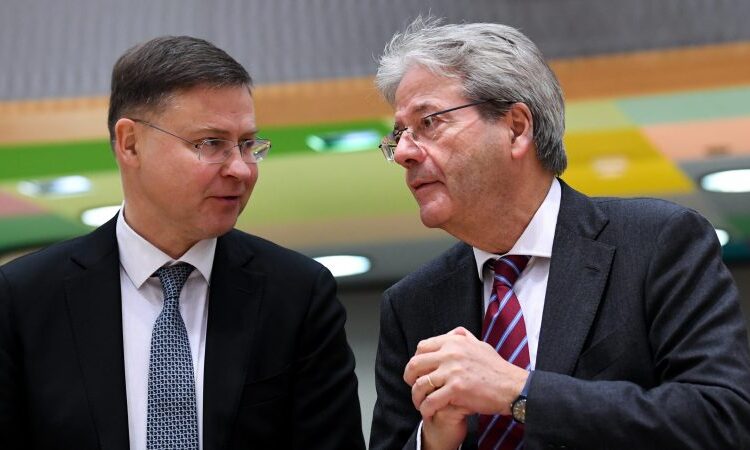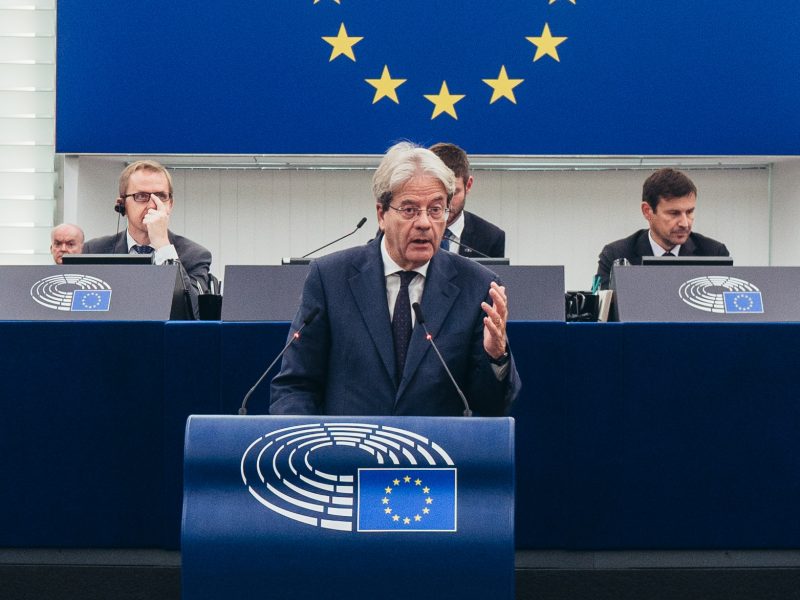
EU member state finance ministers met in Brussels on Tuesday (14 February) to discuss the reform of the EU’s debt and deficit rules, but their positions remain divergent, despite pressure to agree.
The EU Commission aims at an agreement in principle among member states in March so it can propose specific legislative changes in late March or early April of 2023 at the latest.
“We are approaching crunch time,” Executive Vice-President of the Commission Valdis Dombrovskis told reporters ahead of the meeting.
The Commission had proposed reforming the rules that determine how much debt and deficits EU member states can accumulate in November 2022. The current rules, the enforcement of which has been paused since the pandemic in 2020 due to a general escape clause, are generally thought to have been too rigid and bad for growth since they discourage public investments.
The Commission’s reform proposals from last November suggested more individual, country-specific debt reduction paths that would give countries more time and leeway to invest and to implement reforms that can boost the economy and thus lower a member state’s debt burden relative to its economic power.
At the same time, there would be an enhanced role for the EU Commission as it’s up to the EU executive to determine the viability of member states’ debt reduction paths.
Ahead of the ministers’ meeting, Commissioner Paolo Gentiloni said, “We have to [continue] the discussion on the relation between the approach based on national plans and the need for a common framework because we can’t have national plans without a common framework.”
Not on the same page
While Gentiloni put the challenge in diplomatic terms, Slovenian Finance Minister Klemen Boštjančič put it more bluntly. “We’re not on the same page,” he said, arguing that there were “still big differences” among member states on how the rules should look.
For example, the Irish and the Belgian finance ministers were open to the proposed changes, but the Austrian State Secretary Florian Tursky argued that the EU should simply go back to the old rules.
“I don’t think there is a reason for Austria to deviate from its hard and clear position,” he said.
However, some baby steps towards an agreement seem to have been taken despite the differences.
The liberal German Finance Minister Christian Lindner, who long showed himself opposed to any relaxation of fiscal rules, said that “the German government is ready to recognise that we have new investment necessities and that debt levels have increased to a level that an unchanged application of the old rules would pose an almost insurmountable challenge for some member states.”
While this admission can be interpreted as a small hint towards a possible compromise, Lindner also said that the Commission proposal was like setting foot on a unknown continent, and nobody could foresee what the reform could lead to, which is why he could not consent to them like this.
No General Escape Clause for 2024
At the meeting in Brussels, the discussion on fiscal rules among member state ministers took longer than planned. Not much time remains if ministers are to adhere to the Commission’s tight time plan.
The Commission wants to propose its legislative proposal in early April at the latest, as member state governments and the European Parliament have to approve the proposal before the end of the year for the rules to be applicable in 2024.
Already in March, the Commission wants to provide some guidance for member states so that they can start planning their budgets for next year, for which member states will need to have a clear understanding of the rules that will be in place.
An easy way out of the time pressure on the reform of the fiscal rules would be the renewed application of the General Escape Clause that would pause the enforcement of the current fiscal rules for another year.
However, the Commission has no interest in this shortcut that reduces its influence on member states’ fiscal policies. “The General Escape Clause will no longer apply,” Dombrovskis said.
Therefore, there appears to be no way to circumvent tough negotiations and compromises in the coming weeks. As Elisabeth Svantesson, the Swedish minister for finance who chaired Tuesday’s meeting, concluded: “A lot of work remains.”
[Edited by Alice Taylor]








